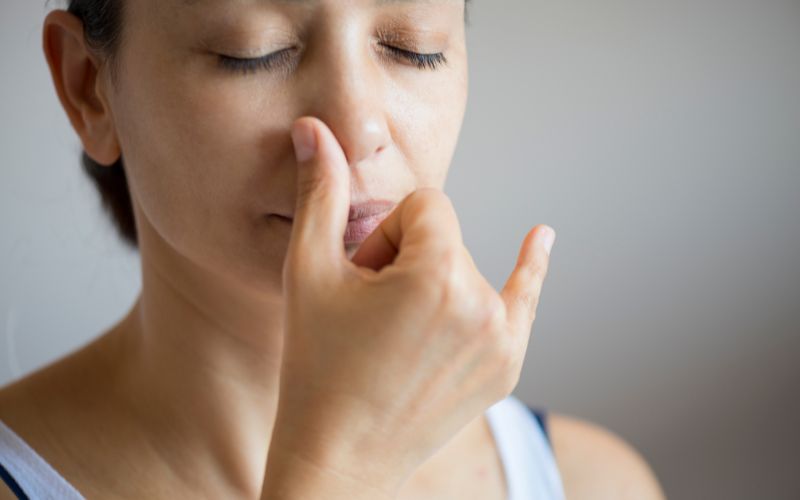Discover Peace of Mind: Best Stress Treatment for Lasting Relief

Decoding Stress: What It Is and How It Affects You
Stress is an inevitable part of life, affecting individuals differently. Understanding stress, its causes, symptoms, and treatment options is crucial for managing its impact on mental and physical health. Dr. Samyuktha, a renowned psychiatrist, provides expert insights and treatment for stress at Pushpa Mind Care, helping patients lead healthier and more balanced lives.
What is Stress?

Stress is the body’s response to any demand or challenge. It can be triggered by various factors, including work pressure, financial problems, relationship issues, and significant life changes. While stress is a normal reaction, chronic stress can lead to severe health issues if not managed properly.
Types of Stress
Stress can be categorized into acute stress and chronic stress. Acute stress is short-term and usually occurs in response to a specific event. Chronic stress, however, persists over a long period and can lead to serious health issues if not managed effectively.
Causes of Stress
Numerous factors can cause stress, including:
- Work-Related Issues: Deadlines, high workloads, job insecurity, and conflicts with colleagues.
- Personal Relationships: Family conflicts, divorce, and lack of support from loved ones.
- Financial Problems: Debt, unemployment, and unexpected expenses.
- Health Concerns: Chronic illnesses, injury, and mental health disorders.
- Major Life Changes: Moving, changing jobs, or losing a loved one.
The Impact of Stress on Physical and Mental Health
Stress can have profound effects on both physical and mental health. Physically, chronic stress can lead to conditions such as hypertension, heart disease, diabetes, and weakened immune function. Mentally, it can contribute to anxiety, depression, and cognitive impairments. It often manifests in symptoms like headaches, muscle tension, fatigue, and digestive issues. Additionally, prolonged stress can affect sleep patterns, leading to insomnia or poor-quality sleep. Understanding these impacts is crucial, as they highlight the importance of effective treatment for stress to maintain overall well-being and prevent serious health issues.
Symptoms of Stress
Stress can manifest in various physical, emotional, and behavioral symptoms:
Physical Symptoms
- Headaches
- Muscle tension or pain
- Fatigue
- Sleep disturbances
- Digestive issues
Emotional Symptoms
- Anxiety
- Depression
- Irritability
- Mood swings
Behavioral Symptoms
- Changes in appetite
- Procrastination
- Increased use of alcohol, drugs, or tobacco
- Social withdrawal
Treatment Options for Stress
Managing stress requires a holistic approach that includes lifestyle changes, psychological therapies, and medications.
1. Lifestyle Changes to Manage Stress
Adopting certain lifestyle changes can significantly help manage and reduce stress levels. Regular physical activity, such as walking, swimming, or yoga, helps release endorphins, which are natural stress relievers. A balanced diet rich in fruits, vegetables, lean proteins, and whole grains can support physical health and improve mood. Prioritizing adequate sleep, practicing good time management, and setting realistic goals can also mitigate stress. Additionally, engaging in hobbies, spending time with loved ones, and limiting exposure to stressful environments or situations are vital components of a treatment for stress.

2. Psychological Therapies
- Cognitive Behavioral Therapy (CBT): A form of psychotherapy that helps patients identify and change negative thought patterns.
- Mindfulness-Based Stress Reduction (MBSR): A program that combines mindfulness meditation and yoga to reduce stress.
- Counseling: Talking to a counselor or therapist can provide support and strategies for managing stress.
3. Medications
In some cases, medications may be prescribed to help manage stress-related symptoms. These can include:
- Antidepressants: For managing symptoms of depression and anxiety.
- Anti-Anxiety Medications: For short-term relief of severe anxiety.
- Sleep Aids: For those experiencing severe sleep disturbances.
The Role of Exercise in Reducing Stress
Exercise is a powerful tool for reducing stress. Regular physical activity promotes the release of endorphins, the body’s natural mood lifters. Activities like running, cycling, swimming, or even brisk walking can help lower stress levels. Exercise also improves sleep quality, enhances self-esteem, and provides a healthy outlet for frustration and anxiety. It can distract from daily worries, allowing a mental break and a sense of calm. Whether it’s a structured workout routine or simply incorporating more movement into daily life, exercise is an effective and natural way to support treatment for stress.
Nutrition and Stress: Eating for a Calm Mind
Nutrition plays a crucial role in managing stress. A balanced diet can enhance mood and energy levels, contributing to overall well-being. Foods rich in vitamins and minerals, such as leafy greens, nuts, seeds, and fish, support brain health and help reduce stress. Complex carbohydrates, like whole grains, promote the production of serotonin, a neurotransmitter that has a calming effect. Staying hydrated and avoiding excessive caffeine, sugar, and alcohol can prevent mood swings and energy crashes. Mindful eating practices also help in recognizing and managing emotional eating triggered by stress. A well-balanced diet is a fundamental component of a comprehensive treatment for stress.
Mindfulness and Meditation Techniques for Stress Relief
Mindfulness and meditation are effective techniques for stress relief. Mindfulness involves staying present and fully engaging with the current moment, which can reduce anxiety about the past or future. Meditation practices, such as focused breathing, guided imagery, and progressive muscle relaxation, help calm the mind and body. These techniques lower stress hormones, decrease heart rate, and enhance overall emotional well-being. Regular practice can improve focus, increase self-awareness, and build resilience against stress. Incorporating mindfulness and meditation into daily routines can provide lasting benefits for managing stress and form a crucial part of a holistic treatment for stress.
Breathing Exercises to Alleviate Stress

Breathing exercises are simple yet effective methods to alleviate stress. Techniques like deep breathing, diaphragmatic breathing, and the 4-7-8 method can quickly calm the nervous system. Deep breathing involves inhaling deeply through the nose, allowing the abdomen to expand, and exhaling slowly through the mouth. This process increases oxygen flow, slows the heart rate, and promotes relaxation. Practicing these exercises regularly can help manage acute stress and anxiety, improve concentration, and enhance overall emotional balance. They can be done anywhere, making them a convenient tool for treatment for stress.
The Importance of Sleep in Stress Reduction
Sleep is crucial for stress reduction and overall health. During sleep, the body repairs itself and the mind processes emotions and experiences, which helps manage stress. Chronic sleep deprivation and sleep disorders, such as insomnia or sleep apnea, can exacerbate stress levels, impair cognitive function, and increase the risk of anxiety and depression. Establishing a regular sleep schedule, creating a restful environment, and practicing good sleep hygiene, such as avoiding screens before bedtime and reducing caffeine intake, can improve sleep quality. Prioritizing adequate, restorative sleep is essential for maintaining mental clarity, emotional stability, and resilience against stress. Ensuring quality sleep, free from disturbances caused by sleep disorders, is a vital part of effective treatment for stress.
Stress Reduction Through Hobbies and Leisure Activities
Participating in hobbies and leisure activities is a great way to reduce stress. Fun activities like reading, gardening, painting, or playing an instrument offer a break from daily worries. These hobbies can improve your mood, boost creativity, and give a sense of achievement. Social hobbies, like joining clubs or playing group sports, provide chances to interact with others and gain support, which can help relieve stress. Making time for leisure activities regularly helps maintain a healthy balance between work and personal life and supports overall well-being. Including hobbies in your daily routine can greatly improve stress management
Why Choose Dr. Samyuktha
Dr. Samyuktha stands out as a leading psychiatrist in stress management for several reasons:
- Expertise and Experience: With years of experience in psychiatry, Dr. Samyuktha offers deep insights and effective treatments for stress-related issues.
- Personalized Treatment Plans: Each patient receives a customized treatment plan tailored to their unique needs and circumstances.
- Comprehensive Approach: Combining lifestyle changes, psychological therapies, medications, and support networks, Dr. Samyuktha ensures a holistic approach to stress management.
- Patient-Centered Care: Dr. Samyuktha prioritizes patient comfort and well-being, providing compassionate and empathetic care throughout the treatment process.
- Proven Success: Many patients have successfully managed their stress and improved their quality of life under Dr. Samyuktha’s guidance.
Workplace Stress: Strategies for a Healthier Work Environment

Managing workplace stress is essential for maintaining productivity and well-being. Strategies include setting clear boundaries between work and personal life, taking regular breaks, and prioritizing tasks to prevent overwhelm. Effective communication with colleagues and supervisors can address issues and create a supportive environment. Incorporating stress-relief activities, such as stretching, mindfulness exercises, or short walks, during the workday can also help. Additionally, creating a comfortable and organized workspace can reduce stress. Employers can contribute by promoting a positive work culture, offering flexible schedules, and providing resources for stress management. These strategies are essential components of a workplace treatment for stress.
Long-Term Strategies for Maintaining Stress Resilience
Building long-term resilience to stress involves adopting sustainable habits and practices. Developing a regular routine that includes exercise, healthy eating, and adequate sleep creates a strong foundation for stress management. Practicing mindfulness, meditation, and relaxation techniques can help maintain emotional balance. Building a strong support network of friends, family, or support groups provides social support during stressful times. Continuous learning and personal growth, such as developing new skills or hobbies, can enhance self-efficacy and confidence. Emphasizing self-care and regularly reassessing and adjusting stress management strategies ensure long-term resilience. These practices form the cornerstone of long-term treatment for stress.
Expert Opinions and Statistics
Research shows that stress management techniques can significantly improve mental and physical health. According to the American Psychological Association (APA), 77% of people experience stress that affects their physical health, and 73% experience stress that impacts their mental health. However, engaging in stress management activities such as exercise and mindfulness can reduce these effects by 30-50%. These statistics underscore the importance of effective treatment for stress.
Actionable Tips for Managing Stress
To manage stress effectively, it’s important to develop healthy coping mechanisms. This includes setting realistic goals, prioritizing tasks, and taking regular breaks. Engaging in hobbies and activities that bring joy can also help reduce stress levels. Additionally, practicing gratitude and maintaining a positive outlook can enhance emotional resilience.
Book an Appointment
Managing stress is crucial for maintaining overall health and well-being. Dr. Samyuktha at Pushpa Mind Care offers comprehensive treatment options tailored to individual needs, helping patients effectively manage stress and improve their quality of life. For more information or to schedule an appointment, visit Pushpa Mind Care. Book an appointment at https://pushpamindcare.co.in/.
Frequently Asked Questions (FAQs)
Physical: headaches, muscle tension, fatigue, digestive issues. Emotional: anxiety, depression, irritability, mood swings. Behavioral: changes in appetite, procrastination, increased use of alcohol/drugs, social withdrawal.
Regular exercise, a balanced diet, adequate sleep, good time management, and engaging in hobbies can significantly reduce stress.
Cognitive Behavioral Therapy (CBT), Mindfulness-Based Stress Reduction (MBSR), and counseling are effective therapies for stress management.
A balanced diet rich in vitamins, minerals, and complex carbohydrates can enhance mood and reduce stress. Avoiding excessive caffeine, sugar, and alcohol also helps.
Quick and effective techniques to alleviate stress immediately include deep breathing exercises, and diaphragmatic breathing. These breathing exercises calm the nervous system by increasing oxygen flow and slowing the heart rate. Practicing mindfulness and meditation can also provide rapid relief from stress by helping the mind and body relax.

